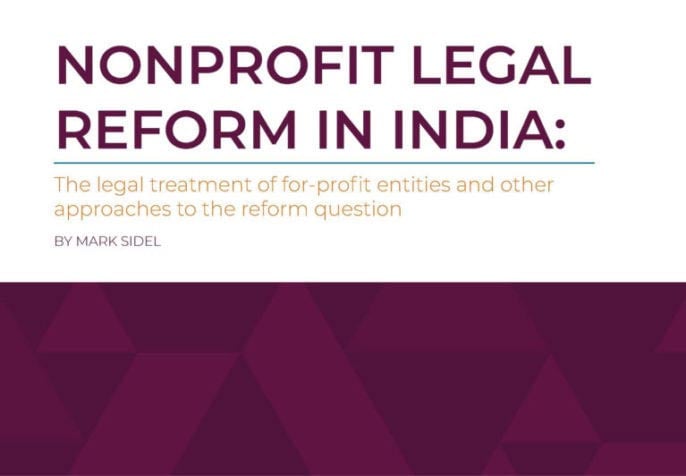Civil society organizations and governments cooperate in various ways, from joint policy development to funding agreements. ICNL works with both groups to formulate enabling laws and policies and create mechanisms that foster cooperation. Along with our partners, we support the development of policy documents, help establish government offices and contacts for CSOs, facilitate cross-sectoral advisory bodies focused on specific issues, and provide advice about mechanisms and laws to regulate civil society funding and social contracting.
Civil Society & Government Cooperation
Strong partnerships with civil society organizations can help governments better understand local needs, find the best solutions to emerging problems, and make positive impacts more efficiently.
Project Highlight
Civil Society & Government Cooperation
Is the Coronavirus Catalyzing New Civic Collaborations for Open Government?
This report from the Carnegie Endowment for International Peace includes findings and key recommendations for NGOs, grassroots groups, and donors to understand how the COVID-19 pandemic is impacting civil society collaborations for open government reforms.
Guidelines on Government and CSO Cooperation in Morocco
This 2017 document examines legal mechanisms that can facilitate CSO and government cooperation at the national, regional, provincial, and community levels in Morocco. The guidelines include recommendations on their implementation based on successful models of cooperation from around the world.
Models to Promote Cooperation between Civil Society & Public Authorities
This 2013 publication provides an overview of best practices in government and CSO cooperation. It identifies mechanisms developed in countries in the Middle East, North Africa, and other regions. Available in English and Arabic.
Analysis of Cooperation between State & Civil Society Organization Policies
This comparative analysis looks at policy papers that address cooperation between government bodies and CSOs in Bulgaria, Georgia, Moldova, Estonia, Croatia, and the Philippines.
Setting Up A Regulatory Framework for Partnership in Brazil
This case study discusses the development of the regulatory framework for CSOs in Brazil, which included an inspiring participatory process.
Keeping Up the Momentum: Improving Cooperation in the Western Balkans & Turkey
This ECNL report analyzes cooperation between civil society and public institutions in the Western Balkans and Turkey.
Implementation of Policy Documents and Liaison Offices that Support Civil Society Development
This ECNL research paper discusses the role that European government liaison offices supporting civil society can play in implementing plans for improved cooperation.
A Comparative Analysis of European Practices of NGO-Government Cooperation
This article produced by ECNL offers a European perspective on policies and practices shaping cooperation between civil society and government in European Union member states and other Central and Eastern European countries.
Criteria for Selection of Civil Society Organizations in Cross-Sector Bodies
ECNL co-authored this comparative paper on the criteria and mechanisms for appointing CSOs to government bodies, including cross-sector working groups, councils, and national boards. It also discusses models to help improve the legal framework and guidance available to government officials and civil society.
Mechanisms for Nominating NGO Representatives
This Bulgarian Center for Not-for-Profit Law (BCNL) report discusses the professional relationships and mechanisms used to nominate and elect CSO representatives to state commissions and other consultative positions in Central and Eastern Europe.
Public Funding
Lottery Proceeds for CSO Work: Luck Has Nothing to Do with It
This paper, focusing on Europe, provides a comparative overview of the legal basis, strategies, and programs for defining funding priorities from lottery incomes and the amounts made available for CSOs.
Public Funding for Civil Society Organizations
This paper examines best practices for government financing of CSOs in the Western Balkans and European Union member states.
National Funds to Support Civil Society Organizations
This 2010 paper explores key strategic and operational questions arising during the development of national funds and foundations to support CSOs. Available in English and Arabic.
Social Contracting
Analysis of State Procurement of Social Services in the Kyrgyz Republic
This 2013 analysis of the Kyrgyz Republic’s Law on State Procurement of Social Services includes an overview of best practices and recommendations for improving the approach in the Kyrgyz Republic.
Inclusion of Civil Society Organizations in Government Contracting
This paper was prepared to help the Government of Mongolia reform its approach to contracting with CSOs. It examines international best practices and outlines steps in developing both the underlying concept and provisions of the new legislation.
A Handbook on Non-State Social Service Delivery Models
This handbook prepared by ECNL outlines the ways in which governments can cooperate with non-state actors to deliver social services. It aims to serve as a guide for policymakers and practitioners in Central Asia.
All Resources Related to Civil Society & Government Cooperation
Good Governance and Civic Space

Civic Engagement and Lawmaking in the Kyrgyz Republic

Is the Coronavirus Catalyzing New Civic Collaborations for Open Government?

Positive Government Responses to COVID-19

Legal Manual for Civil Society Organizations in Bangladesh

Nonprofit Legal Reform in India

![ICNL training for members of Morocco’s House of Councillors, November 2017, Rabat [Photo ICNL] ICNL training for members of Morocco’s House of Councillors, November 2017, Rabat (Photo: ICNL)](https://www.icnl.org/wp-content/uploads/Morocco-photo.jpg)